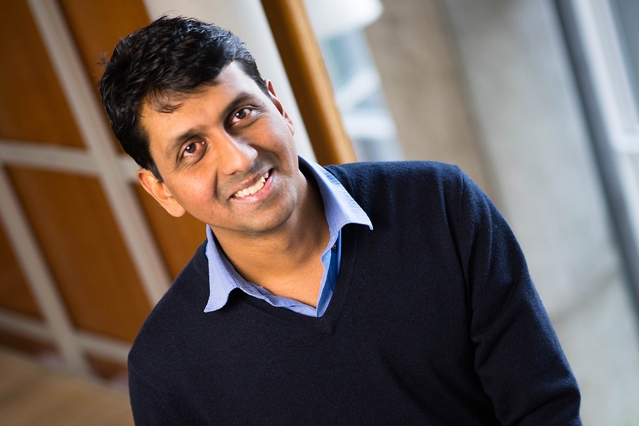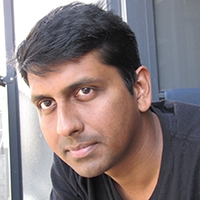MIT professor of electrical engineering and computer science (EECS) and Computer Science and Artificial Intelligence Laboratory (CSAIL) member Vinod Vaikuntanathan was one of four outstanding undergraduate teachers and mentors have been named MacVicar Faculty Fellows. He joins professor of EECS Karl Berggren, professor of political science Andrea Campbell, and associate professor of music Emily Richmond Pollock in receiving the honor.
For more than 30 years, the MacVicar Faculty Fellows Program has recognized exemplary and sustained contributions to undergraduate education at MIT. The program is named in honor of Margaret MacVicar, MIT’s first dean for undergraduate education and founder of the Undergraduate Research Opportunities Program (UROP).
New fellows are chosen each year through a highly competitive nomination process. They receive an annual stipend and are appointed to a 10-year term. Nominations, including letters of support from colleagues, students, and alumni, are reviewed by an advisory committee led by vice chancellor Ian Waitz with final selections made by provost Cynthia Barnhart.
Role models both in and out of the classroom, Berggren, Campbell, Pollock, and Vaikuntanathan join an elite academy of scholars from across the Institute who are committed to curricular innovation; exceptional teaching; collaboration with colleagues; and supporting students through mentorship, leadership, and advising.
A "humbling" experience for Vaikuntanathan
Vinod Vaikuntanathan is a professor in the Department of EECS. He received his bachelor’s degree in computer science from the Indian Institute of Technology Madras in 2003 and his SM and PhD degrees in computer science from MIT in 2005 and 2009. Vaikuntanathan joined the faculty in 2013 and in recognition of his contributions to teaching and service to students, he received the Harold E. Edgerton Faculty Achievement Award in 2017 and the Ruth and Joel Spira Award for Distinguished Teaching in 2016.
Vaikuntanathan has taught all three EECS undergraduate theoretical computer science subjects including 6.1210, formerly 6.006 (Introduction to Algorithms); 6.1200, formerly 6.042 (Mathematics for Computer Science); and 6.1220, formerly 6.046 (Design and Analysis of Algorithms).
Students say his classes are challenging, yet approachable and inclusive. Helen Propson ’24 writes, “He excels at making complex subjects like cryptography accessible and captivating for all students, creating an atmosphere where every student’s input is highly regarded. He embraces questions and leaves students feeling inspired and motivated to tackle challenging problems, fostering a sense of confidence and a belief in their own abilities.” She goes on to say, “He often describes intricate concepts as ‘magical,’ and his enthusiasm is contagious, making the material come alive in the classroom.”
MIT alumna Anne Kim concurs: “His teaching style is characterized by its clarity, enthusiasm, and a genuine passion for the subject matter. In his classes, he managed to distill complex algorithms into digestible concepts, making the material accessible to students with varying levels of expertise.”
Vaikuntanathan has also made significant contributions to the EECS curriculum. In spring 2022, he, along with fellow professors in the department, led an effort to improve 6.046. According to professor of EECS and MacVicar Fellow Srini Devadas, “designing a new lecture for 6.046 is not easy. Each new lecture is, typically, days of prep work, including preparing to … give the lecture itself and writing and testing problem set questions, quiz questions, and quiz practice questions. Vinod did all this with skill, aplomb, and enthusiasm. His contributions have had a permanent and beneficial effect on 6.046.”
Widely known for his work in cryptography, including homomorphic encryption and computational complexity, Vaikuntanathan became the lecturer-in-charge of the department’s first theoretical cryptography offering, 6.875. In addition, as the fields of quantum and post-quantum cryptography have grown, “Vinod has added relevant modules to the syllabus, taking the place of topics which had grown obsolete,” Devadas remarks. “Some professors might see teaching the same class multiple times as a chance to save themselves work by reusing the same materials. Vinod sees teaching 6.875 every fall as an opportunity to keep improving the class.”
Vinod Vaikuntanathan is also a devoted mentor and advisor, assisting with first-year UROPs and encouraging students to take advantage of his “open-door” policy. Kim writes that Professor Vaikuntanathan is benefiting her career still as “his mentorship ... extends beyond the classroom through his research” and that he “has mentored and advised dozens of [her] friends in the cryptography space.”
“His encouraging demeanor sets a remarkable example of the kind of teacher every student hopes to encounter during their academic career,” says Propson.
On becoming a MacVicar Faculty Fellow Vaikuntanathan writes, “It is humbling to be in the company of such amazing teachers and mentors, many of whom I have come to think of as my role models. Many thanks to my colleagues and my students for considering me worthy of this honor.”


